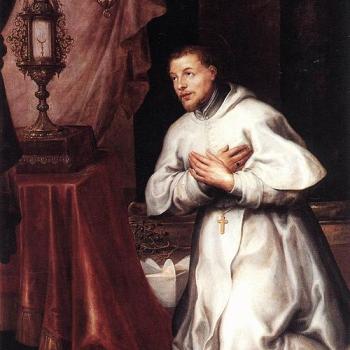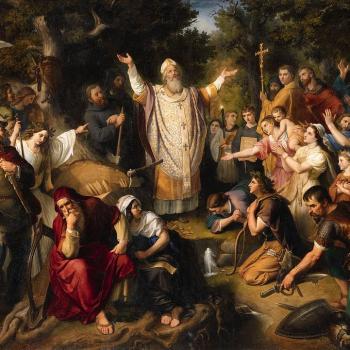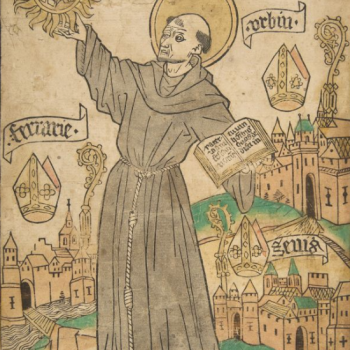This week the Western Churches remember Saint Bernard of Clairvaux. Bernard worked for peace within the church during a time of division. Born in 1090 he lived through a time of tumult in the church. The church had just split with the east, and the crusades were about to begin. Bernard played a major role in the history of the church during his life.
I have always had a bit of mixed feelings about Bernard. On the one hand he fought against Abelard, who I strongly dislike. On the other hand he helped promote the Second Crusade, which in retrospect was a disaster. He was certainly a man of his own times and should be seen within the context he lived in.
Here are the essential things you need to know about Bernard:
- He was an amazing preacher
- He helped end the schism within the Church in 1130,
judging between rival Popes
- He was a big part of the Second Lateran Council
, which among other things may have banned the use of crossbows against Christians.
- The Catholics call him a “Doctor of the Church”
- He was the face of The Second Crusade
- He took out the semi-Sabellian logician Peter Abelard
He is also credited with writing the classic poem “Oh Sacred head, now wounded.” This poem is the basis for one of my favorite Hymns… I have included the lyrics below:
Lyrics (J.W. Alexander’s version, 1830)
O sacred Head, now wounded, with grief and shame weighed down,
Now scornfully surrounded with thorns, Thine only crown;
How pale Thou art with anguish, with sore abuse and scorn!
How does that visage languish, which once was bright as morn!
What Thou, my Lord, hast suffered, was all for sinners’ gain;
Mine, mine was the transgression, but Thine the deadly pain.
Lo, here I fall, my Savior! ’Tis I deserve Thy place;
Look on me with Thy favor, vouchsafe to me Thy grace.
Men mock and taunt and jeer Thee, Thou noble countenance,
Though mighty worlds shall fear Thee and flee before Thy glance.
How art thou pale with anguish, with sore abuse and scorn!
How doth Thy visage languish that once was bright as morn!
Now from Thy cheeks has vanished their color once so fair;
From Thy red lips is banished the splendor that was there.
Grim death, with cruel rigor, hath robbed Thee of Thy life;
Thus Thou hast lost Thy vigor, Thy strength in this sad strife.
My burden in Thy Passion, Lord, Thou hast borne for me,
For it was my transgression which brought this woe on Thee.
I cast me down before Thee, wrath were my rightful lot;
Have mercy, I implore Thee; Redeemer, spurn me not!
What language shall I borrow to thank Thee, dearest friend,
For this Thy dying sorrow, Thy pity without end?
O make me Thine forever, and should I fainting be,
Lord, let me never, never outlive my love to Thee.
My Shepherd, now receive me; my Guardian, own me Thine.
Great blessings Thou didst give me, O source of gifts divine.
Thy lips have often fed me with words of truth and love;
Thy Spirit oft hath led me to heavenly joys above.
Here I will stand beside Thee, from Thee I will not part;
O Savior, do not chide me! When breaks Thy loving heart,
When soul and body languish in death’s cold, cruel grasp,
Then, in Thy deepest anguish, Thee in mine arms I’ll clasp.
The joy can never be spoken, above all joys beside,
When in Thy body broken I thus with safety hide.
O Lord of Life, desiring Thy glory now to see,
Beside Thy cross expiring, I’d breathe my soul to Thee.
My Savior, be Thou near me when death is at my door;
Then let Thy presence cheer me, forsake me nevermore!
When soul and body languish, oh, leave me not alone,
But take away mine anguish by virtue of Thine own!
Be Thou my consolation, my shield when I must die;
Remind me of Thy passion when my last hour draws nigh.
Mine eyes shall then behold Thee, upon Thy cross shall dwell,
My heart by faith enfolds Thee. Who dieth thus dies well.













